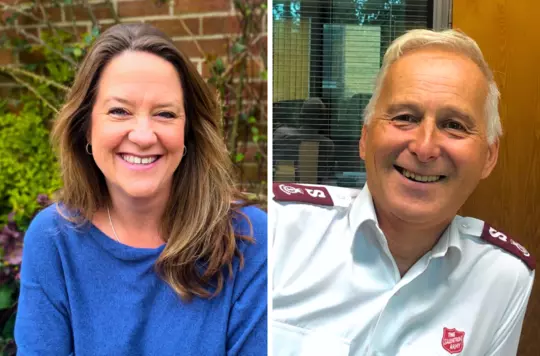25 November 2023
How hard is it to be patient?
Major Sarah Butler
Major Sarah Butler encourages us to stand firm in faith as we wait for the Lord’s coming.
Key text
Joyce Meyer wrote: ‘Patience is not simply the ability to wait – it’s how we behave while we’re waiting.’ What do you do when you’re waiting for something? Do you pace up and down, aimlessly passing the time? Do you prefer to use your time productively, busily getting on with tasks? Does it depend on what you are waiting for, an exciting opportunity or a terrifying reality?
In this passage, James speaks about being patient as we wait for the Lord’s coming. For those early disciples, perhaps this was not only an exciting opportunity to meet with Jesus, but also a terrifying reality of pending judgement.
Pause and reflect
- What would life be like if we spent it pacing up and down aimlessly as we waited for the Lord’s coming?
- What would it be like if we distracted ourselves with tasks and activity?
As James urges us to stand firm in our waiting, does that mean that we need to just stand idly around, watching the world go by? No. We are to stand firm in the truths of the gospel and our knowledge of Christ in order that we do not waver from our devotion to him.
There must be room in our lives for stopping and waiting as well as for action. We need times of quiet, patient waiting to remind us of the wonder and mystery of what we are waiting for. We do not want to become so distracted by busyness that we forget the real meaning of the prize ahead. However, we also need focused times of action to carry out God’s mission of going out and making disciples.
There must have been grumbles and disappointments even in the early days of the Church, as James is very up front with his warning to them. Taking out our frustrations on others will never have a positive outcome, and yet this is probably one of the biggest struggles we have when it comes to patience. We struggle with the ability to keep our cool when other people exasperate or annoy us.
Pause and reflect
- How easy is it to refrain from grumbling to and about others amid frustration, or when we lose hope in the waiting?
- How often do we lose our patience with others when their methods of waiting differ from ours?
We are encouraged to exhibit the same patient faith that the prophets showed when, even in the midst of adversity and suffering, they spoke in the name of the Lord (see vv10 and 11) – people of faith who have shown great courage and patience in the worst of suffering but who were rewarded in the end because the Lord is full of compassion and mercy. No matter the cost, these people – whose suffering was enormous – kept going because they had faith in God.
Pause and reflect
- When are the times we state that life is unfair?
- To what extent do we remember or forget that the Lord is full of compassion and mercy? Why is this?
In the second half of this passage, James speaks about praying in faith and, particularly, about how the community of believers can come together and support each other in all circumstances (see vv13–16).
One of the amazing beauties of being part of a healthy spiritual congregation is the fact that, no matter what we are going through, we can share it with our fellow believers and experience true Christian love and friendship. It is when things are hard – times when we experience trouble and sickness – that others will lift us up to God’s throne in prayer. When there are things to celebrate, we can rejoice together in the goodness of God.
This deep level of fellowship sometimes requires us to be vulnerable with each other. We also need to exercise patience with each other as we all wrestle with what life throws at us in different ways. Church is at its very best when we are able to lay down our differences, be open with each other and support each other as we, together, grow as disciples.
Pause and reflect
- When was the last time someone prayed over you when you were sick or in trouble?
- When have you prayed over someone else who was experiencing a difficult time with their health?
Being vulnerable with each other does not come easily to many of us. Allowing others into areas of our lives such as sickness or sin requires a great deal of trust and honesty.
However, importantly, in this togetherness we find a new-found freedom; our faith is deepened and our relationships with each other and with God grow exponentially. When we allow ourselves to become vulnerable, we can find true healing and freedom in Christ.
Our study passage tells us of our great responsibility to bring others back into truth (see vv19 and 20), exercising deep honesty, integrity and courage. James reminds us that Elijah was just an ordinary human being like us and yet, when he prayed, things happened (see vv17 and 18) – big things!
As a younger Christian, I was encouraged – not least by trendy ‘Push’ wristbands – to ‘Pray Until Something Happens’. The idea being that, if we are persistent in prayer, we will bring about the changes we are hoping for.
I wonder what would happen if, like Elijah, we didn’t just stop there, but we kept on praying, beyond the hope, beyond the waiting.
Pause and reflect
- What do you do in the waiting?
- Are you quiet?
- Are you active?
- Are you praying?
Bible study by

Major Sarah Butler
Corps Officer, Bognor Regis
Discover more

Lyn Woods talks to Restored UK and Family Ministries about their partnership working with survivors of domestic abuse.

Join Salvationists across the territory in worship, with music, prayer and a Bible message from a guest speaker.

A This is My Story podcast special, celebrating the life and music of Major Joy Webb.

